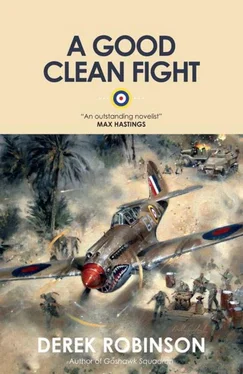“Just the two of us,” Lampard said. “And Menzies, but he’s not drinking.”
Gibbon was startled and dismayed, but he hid his feelings and he knew better than to ask questions. There was plenty of tea to go around. Lieutenant Sandiman had an urgent signal for Lampard to read; however, he decided to let him get a good drink inside him first. The day’s work was not over yet.
CHAPTER EIGHT
Most Urgent
The order came down the chain of command at Desert Air Force, gaining force at every stage like a ball bouncing down a staircase, until it landed at LG 250. Prescott decoded it in two minutes. Barton read it aloud. “Movement order canceled,” he said. “Operation imminent. Bletchley will brief.” He cheered up enormously. “See, Skull? The game’s never over till it’s over.”
“I’ll write that in Kit’s book,” Skull said. “I think there’s room.”
Baggy Bletchley flew in half an hour later, in the Brute.
“By a remarkable stroke of luck, Fanny,” he said, “you’re in exactly the right place at exactly the right time.”
“Luck is very important, sir,” Barton said. “Some have it, some don’t. Let me carry those maps.”
They went to the mess tent. Hooper, Prescott and Skull were already there. “I thought you’d gone,” Bletchley said to Skull.
“I do the cooking and some light dusting. My bully fritters are well spoken of.”
Bletchley was not listening. He unrolled a map and said, “The most extraordinary thing happened a few hours ago. A Heinkel 111 flew down to Fort Lamy and cut the Takoradi Trail, just like that.” He snapped his fingers. “Not only did the rascal destroy a whole lot of brand-new Hurricanes, he also set fire to so much aviation fuel that we shan’t be able to get another Hurricane through Lamy for weeks. Very imaginative, thoroughly courageous, and he cannot be allowed to survive. You’re nearest. Go and kill him.”
“Where is he, sir?” Barton asked.
“We know where he’s going. Or rather, we know where he’d like to get to. Defa.” Bletchley circled it on the map. “Little Luftwaffe airstrip. That’s where he refueled on the way out.”
“Defa.” Barton cocked his head and looked from Defa to LG 250 and back again. “Three hundred miles.”
“We have reason to think he will never reach Defa. Two reasons, in fact. One is he simply hasn’t got enough fuel. Normal range of a Heinkel 111 is sixteen hundred miles, by which time it’s flying on fumes. From Defa to Fort Lamy and back is twenty-two hundred miles. If you put enough fuel in the machine to fly that distance it would be so heavy, it could never take off.”
“Especially with a load of bombs.”
“Exactly.”
“You said there were two reasons, sir.”
“I did indeed. The second is a headwind which the pilot is now facing on his return leg. Out of the northwest, twenty to thirty miles an hour. Just what he doesn’t want.”
“Presumably the pilot knows all this,” Skull said. “And presumably the Luftwaffe knows it too.”
“We must assume that,” Bletchley said.
“So they’re waiting for him to come down in the desert,” Barton said, “and then they’ll go and pick him up.”
“Not if you get there first. Our Signals Intelligence people are listening for his transmissions. The instant they get a map reference they’ll flash it to you, here, and you can be on your way.”
Prescott went off to sit beside his wireless set. Barton and Hooper talked to the ground crew. Both fighters were airworthy again: the fuel problem had been solved. The guns were armed, the windscreens cleaned, the radios checked, the entire skin polished with dusters. An unclean aircraft could cost five miles an hour.
“What sort of range has your Kittyhawk got?” Bletchley asked.
“According to the book, nearly six hundred miles. That’s at three hundred miles an hour. If we flew slower I suppose we’d go further.”
“You must get there as fast as you can,” Bletchley said. “You must kill the crew of that Heinkel. The Luftwaffe must not get a taste for the Takoradi Trail, or the whole desert war could be in jeopardy.”
“If you put it like that, sir,” Barton said, “I suppose we’d better get weaving.”
But Prescott still sat in his tent. Bletchley had brought some bread: a rare luxury in the blue. They ate jam sandwiches and waited while the shadows lengthened.
“I’ve been thinking, sir,” Hooper said. “Presumably the map reference locating this Heinkel pilot will apply to a Luftwaffe map. What I mean is, the Luftwaffe grid may not be the same as ours.”
“It’s not,” Bletchley said. “I brought Luftwaffe maps.”
“Oh.”
Skull came over with a jug of tea. Barton felt thirsty, but he was worried about drinking just before a long flight. Hooper drank a pint, and Barton worried about that. Then he remembered that the Kittyhawk cockpit equipment included an exit tube for the pilot’s relief. Trust the Yanks to think of that. He filled a mug and drank.
“In the circumstances,” Skull said thoughtfully, “it rather looks as if Signals Intelligence has broken the Luftwaffe code, sir.”
“I try not to speculate,” Bletchley said. “That way madness lies.”
“Really, sir? You’re missing half the fun.” Skull went away with the empty jug.
“Awkward sod,” Barton said.
“Yes. He makes a good brew-up, though. How does he keep the sand out?”
“Strains it through his socks, I think.”
“Ah.” Bletchley took another sip. “Touched by the foot of God,” he said. “Hello, we’re in business.”
Prescott was hurrying toward them with a slip of paper. On it was a six-figure grid reference. When Barton plotted it on the map, his finger ended up a long way south of Defa. “Start up!” he shouted. Hooper was already running to his Kittyhawk. An engine turned over, a propeller jerked. “No, I’m afraid not,” Bletchley said.
Barton turned and stared.
“It’s not on, Fanny,” Bletchley said. “We’re about fifteen minutes late. Before you get there the sun will have gone down and you’ll never find him in the dark. Work it out for yourself.”
“It’s worth a try,” Barton argued.
“It’s not worth a failure. Forget tonight. Try at dawn tomorrow.”
The engines died. The evening breeze sent the usual colonies of snakes of sand skittering across the landing-ground. The ground crew tied dustsheets around the noses of the Kittyhawks and locked the rudders. Skull began opening tins of bully.
* * *
Lampard was sitting on a box, having his ear stitched together by the doctor, when he saw Sandiman watching him. “Any signals come in?” he asked.
“Yes.”
“Tell me, then.”
Sandiman took out a piece of paper. “I got this a couple of hours ago. It’s marked ‘Most Urgent’ but there was nothing we could do until—”
“Just tell me what’s in it.”
“It’s an order to move immediately and with all speed to a map reference deep in the desert where we’ll find a Heinkel bomber that’s come down. We’re to capture or kill the crew.”
Lampard laughed, hurt his ear severely, apologized to the doctor, and sent for Gibbon. “How soon can we get there?” he asked him.
“It’s a hell of a long way, Jack. Halfway to Kufra and off to the west. If we leave now, and if we don’t have any tire trouble… We might make it some time tomorrow morning. That’s provided we don’t get Stuka-ed. on the way.”
Lampard thought, while the doctor made the last stitches and knotted the silk and trimmed the ends with his scissors. He looked at the sun: it hung heavily in the west. An hour to dusk. “If we go now,” he said, “you can get us through the Jalo Gap before midnight, can’t you?” Gibbon shrugged, but he did not argue. “Then we’ll be in the serir,” Lampard said. “The serir’s really fast. Maybe we can find this Heinkel before dawn.”
Читать дальше












